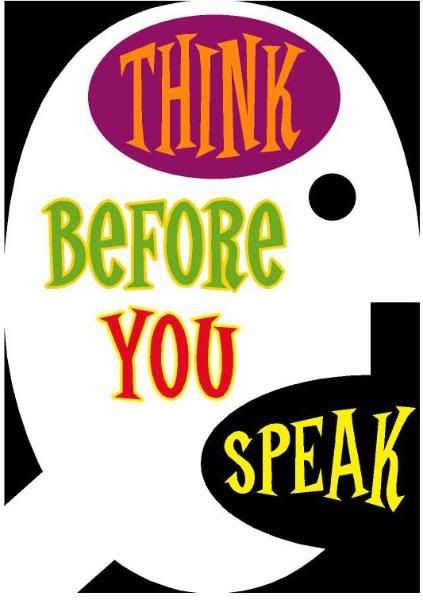
“Wise men talk because they have something to say… fools, because they have to say something.” ~ Plato
Say What You Mean
 Plato lived from 428 BC to 348 BC. And even then, one of the largest human problems that philosophers of the day grappled with was a lack of open, honest communication. Nothing has changed in over two thousand years.
Plato lived from 428 BC to 348 BC. And even then, one of the largest human problems that philosophers of the day grappled with was a lack of open, honest communication. Nothing has changed in over two thousand years.
People then, as now, have trouble saying what they mean and meaning what they say.
People just can’t seem to universally embrace the concept of being impeccable with their words. The phenomenon is a human condition that clearly has eons of history to support it and therefore, one that is very difficult to overcome.
Our old friend Plato knew a thing or two about people. He is quoted far and wide as a philosopher of great wisdom and insight. The quote above indicates that those of us who are wiser than others will withhold our words until we have something of value to offer to a conversation.
Only a Fool
A fool finds no pleasure in understanding but delights in airing his own opinions. Proverbs 18:2 (NIV)
We will not speak for the sake of being heard and we will not speak negatively; thereby eliminating the possibility of saying something incorrect or lacking in integrity. On the other hand, a fool will speak incessantly without thinking and without giving any credence to the feelings, hopes, ambitions or desires of others.
Fools speak for the sole purpose of dominating a conversation and for the pleasure of hearing their own words.
The only people that are impressed by the words of a fool are other fools. They are impressed by verbosity and grandiosity rather than depth, wit, and intelligence. When fools speak, the wise recoil while other fools listen. Just as today, it appears that even in 400 BC there were a lot of fools running around saying foolish things.
4 Agreements
In his book, “The Four Agreements,” Don Miguel Ruiz gives some wonderful clues to better human communication. The four agreements that he asks you to make with yourself are these:
1. NEVER MAKE ASSUMPTIONS
2. DO NOT TAKE THINGS PERSONALLY
3. ALWAYS BE IMPECCABLE WITH YOUR WORD
4. ALWAYS DO YOUR BEST.
They sound quite simple, but think about your own life and ask yourself if you can do all four of them at once.
Very Big Questions
When you hear words coming out of the mouth of a fool, do you assume that the person speaking is deliberately saying something to harm you or others?
Conversely, do you give that person the benefit of the doubt; or do you simply forgive him or her?
When you hear negative words spoken in your direction, do you take them personally?
Do you assume that the person speaking is trying to harm you or make your life less valuable in some way; or do you simply forgive him or her?
When you are speaking, are you always impeccable with your word?
More clearly put, do your words and your intonation contain the best intentions?
Is what you are saying designed to improve the lives of others or to tear them down in some way?
A Golden Standard
Impeccability may be the hardest agreement to make because we all seem to lapse into sarcasm, deceit or guile from time to time. When we do that, we are playing the fool!
Ask yourself, do you always do your best? Or do you pass off a partial effort or a negative pretence as good enough? When we offer less than our best, we allow others the opportunity to find fault with us, thereby enabling another round of poor communication, sarcasm, deceit, and guile.
It is difficult for human beings to avoid playing the fool. Since reading “The Four Agreements” and taking it to heart, I have become very aware of my own failings as a human communicator. I am aware that I have often made incorrect assumptions and taken things personally that were not directed at me at all. I have not always been impeccable with my word because I often used sarcasm, minor deceit, and guile to win an argument or make a point.
Finally, as much as I always want to do my best, I lapse into human slothfulness for one reason or another from time to time and then use deceit and guile to cover up my weakness. I am human and I have played the fool! I am not perfect yet, and I probably never will be, but I believe that self-awareness is the start of a road to a better life.
If you want others to listen to you and follow your lead, always be the best you can be and never play the fool!
——————–
Wayne Kehl is President and CCO at Dynamic Leadership Inc
He is author and behavioral analyst who lectures on leadership and motivation
Email | LinkedIn | Twitter | Web | Blog | Book
Image Sources: media.photobucket.com, caressa1.files.wordpress.com

Very inspired your subject.
Well-done.Hope to come across
The Four Agreements Book”.I am
wondering is it available on
e-version as well?
You can get “The Four Agreements” at Amazon.com. It is available in paper and e-book versions. You can get all of my books there too. Happy reading! Wayne Kehl
Beautiful points and examples.
I’ve found that “I” language helps a lot (e.g. “I don’t follow” over “you aren’t making sense.”)
I’ve also found that simply making things more specific helps make things actionable and tractable.
Some strong ideas here – I like the theme stressing personal integrity – be best – be impeccable yet don’t take things personally. Communicating is a gift but everybody can practice these tips and improve. Thanks!
See also http://jet-productmanagementandmarketing.blogspot.com/2010/11/be-good-speaker_22.html